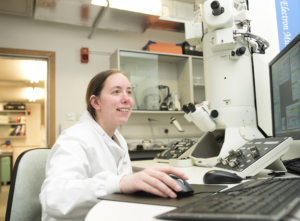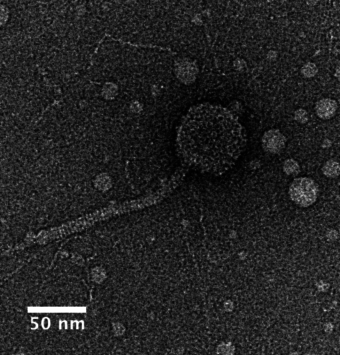Virus Hunters at the University of Warwick
Posted on September 23, 2019 by Saskia Bakker
Recently, a Microbiology Society Education and Outreach Grant was awarded to Saskia Bakker, Manager of the University of Warwick's advanced bioimaging Research Technology Platform (RTP). To help promote their research into the viruses in freshwater, Saskia and her colleagues have designed a number of ways to get the public involved and educate schoolchildren on freshwater viruses.

This is a story about how one thing leads to another. A quick experiment demonstration for work experience students led to two small grants, which funded a project on Zooniverse and an actual stage show.
Our project, simply put, is extreme pond dipping. First you get some water out of a pond, filter it through paper to get rid of the things you’d usually look at with pond dipping and then spin it really fast all night. You can then look at the things that have been collected in the bottom of the tube with an electron microscope, meaning you are able to see things that are too small to see with light.
We find a lot of bacterial viruses this way. Viruses are incredibly abundant – they outnumber living cells ten to one – and they’re everywhere. We also found some things that nobody could identify, which is even more interesting. However, we’d only looked at our pond. We decided we needed to look at other ponds, rivers and canals, and therefore asked people to submit their own water samples.
To allow us to do this, we got some funding from the University of Warwick’s Public Engagement Fund. We asked schools to send us samples, and eight did. We then needed to find a way to systematically analyse the data. This was because there were a lot of data, and because it helps to have unbiased views. Rather than people getting excited at rare viruses, we decided to try crowdsourcing with Zooniverse. The people at Zooniverse have been very helpful, suggesting ways to improve our workflow and increase the appeal of the project.
Despite this, we still have to promote the project to more people. My colleague (who has a long commute) started drawing comics on the train as a resource. We also revamped the website and an undergraduate project student helped us by writing blog posts.

However, to turn collecting water into an actual lesson, you need it to fit in with the curriculum. This is where the Microbiology Society’s Education and Outreach Grant came in. It enabled us to work with a computer game designer who built a hunting game that teaches about the wide variety of microbes that exist at different scales. Together with a set of lesson ideas aimed at Key Stage 2 pupils, the game will hopefully show life at a small scale in an engaging way. We will continue expanding these materials with real-life examples from the water we have received.
As I write this, we are also preparing for the British Science Festival, which is coming to Coventry mid-September. As part of the Family Day event 'Not the Christmas Lectures', we are doing a twenty-minute stage show on virus hunting, as well as a stand. This will be a great opportunity to promote the project and talk to more people about bacteriophages.
The project has been great fun so far and we’re hoping to get more funding to expand it to more ponds (or other water sources). Will you discover a new virus?

